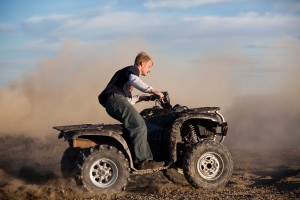Vehicle Owner’s Vicarious Liability

by Denis Alisic
ATV Accident
Recently, a Court of Appeal of Ontario decision released on August 10, 2015, in Fernandes v. Araujo overruled a 1952 decision on the issue of vehicle owner’s vicarious liability for negligent use of the owner’s vehicle; where the owner of a vehicle gives the driver permission to possess the vehicle but limits the driver with respect to the operation of the vehicle. In Fernandes the Plaintiff, Ms. Fernandes, and the Defendant, Ms. Araujo, were visiting a farm owned by Mr. Almeida. During their visit, they decided to assist him with farm work. After they finished with work, Fernandes and Araujo were given permission by Almeida to drive his ATV on the farm but were specifically told not to leave the farm property. Regardless, Fernandes and Araujo left the farm property on the ATV and were involved in a single-vehicle rollover on a public road. Fernandes was seriously injured and sued Araujo as the driver of the ATV and Almeida as the owner of the ATV.
What the insurance company had to say
Almeida’s insurer Allstate brought a Motion for summary judgment dismissing the action against Almeida as owner of the ATV on the basis that Araujo used the ATV without the consent of the owner to leave the farm. Allstate relied on a 1952 Court of Appeal ruling in Newman v. Terdik. In Newman, the court of appeal found vehicle owners not to be vicariously liable for a driver’s negligence even though the driver had the owner’s permission to drive the vehicle on his tobacco farm but did not have the owner’s permission to drive the vehicle on the highways.
In its decision in Fernandes, the Court cited a more recent Court of Appeal ruling, released on August 3, 2007, in a lawsuit filed by Tracy Finlayson and Robert O’Connor against GMAC Leaseco Ltd. Tracy Finlayson and Robert O’Connor were injured as passengers in a truck operated by John Simon. At the time of this accident, John Simons leased the truck from GMAC but was disallowed, under the terms of the lease, from operating the truck. Nonetheless, The Court of Appeal for Ontario decided that GMAC was still vicariously liable for Simon’s negligence.
The Appeal Court in Finlayson noted that “Possession and operation are not the same thing, in law.” The Court of Appeal concluded that since GMAC consented to Simon’s possession of the vehicle but did not consent to his operation of it “breach of conditions placed by the owner on another person’s possession of the vehicle, including those relating to who may operate the vehicle, do not alter the fact of the second person’s possession.”
Relying on Finlayson, the Court of Appeal decided, in Fernandes that it should now overrule the Newman decision “and declare that it no longer represents” the law in Ontario. The Court concluded that Almeida as owner of the ATV continued to be vicariously liable for all of Araujo’s actions as soon as he gave Araujo permission to drive the ATV. This continued to be true even though the ATV was operated against Almeida’s explicit instructions.
The evidence in this case clearly established that Araujo had possession of the ATV with the consent of Almeida as owner. Almeida’s consent made him vicariously liable for the accident. Any restrictions on the use or operation of the ATV would not release the owner from being vicariously liable for the negligence of the person entrusted with using the ATV.
Ontario Court of Appeal
The Court of Appeal proclaimed that to overrule Newman’s decision the Court “would enhance rather than undermine the interest of clarity, coherence and predictability in the law.”
Indeed, the Court cited, David Polowin Real Estate Ltd v. Dominion of Canada General Insurance Co, in order to assess the factors and guiding principles that would allow it to overrule its prior decisions. The Court noted that it must consider the “advantages and disadvantages of correcting the error.” The Court proclaimed that it must analyze the following: the nature of the error; the effect and future impact of either correcting it or maintaining the error; the effect and impact on the parties and future litigants; the effect and impact of its decision, and effects and impacts on the integrity and administration of our justice system.
Furthermore, the Court of Appeal reiterated the discrepancies between Newman and earlier decisions. The Court underlined a continuous chain of subsequent decisions diminishing Newman’s authority. In the end, the Court concluded that Newman formed “an anomaly that cannot be supported in principle, one that undermines the coherence of this area of law and that is likely to lead to confusion.”


